- Home
- Carolyn Keene
The E-Mail Mystery Page 2
The E-Mail Mystery Read online
Page 2
for the next few days.”
“Hello,” Nancy said, smiling at Byron. He nodded
shyly and continued silently up the hallway to the law
library.
“So, what will you be working on, Nancy?” Henry
turned back to Nancy.
“Just clearing some old files off the computer, so my
dad can keep all you guys at work on his new case,”
Nancy said.
“All which guys?” came a strong, female voice from
the hallway. A tall woman walked into the reception
room. “Are you flirting again, Henry? I thought I gave
you some research to do.” Nancy wondered if the
woman was teasing Henry, or if she was serious.
“Yes, Ms. Warner, I was just on my way,” Henry
replied quickly. “And, I'd like you to meet—”
“That's all right, Henry,” Ms. Hanson said, shooing
him out. “I'll take care of the introductions. Blaine, this
is Nancy Drew, Carson's daughter. I'm sure you've
heard about her.”
“Ah, Sherlock Holmes Junior. Yes, indeed, Ms.
Drew, I've heard a lot about you. Your father has told
me about some of your exploits as a junior detective.”
Nancy noticed that Blaine's tone of voice was
formal. Her manner wasn't exactly cold, but it certainly
wasn't warm, Nancy thought as Blaine held out a hand
to shake Nancy's.
“And I've heard a lot about you,” Nancy said,
shaking hands with a firm grip. “My dad has said he
hopes you'll be a role model for me, so that I'll follow
in both your footsteps and become a lawyer.”
Blaine's comment about Nancy's being a junior
detective bothered Nancy a little, but she decided not
to let it get to her. Maybe it's Blaine's attempt at
humor, she thought.
“I see,” Blaine said. “And to what do we owe the
honor of your presence in the office today?”
“I'm just helping with some filing so my dad can
concentrate on the Harris case,” Nancy replied. “I'll be
working here for only a few days before I go visit my
friend George and do some sailing. I'm really looking
forward to it.”
“Well, right now you can look forward to this,” her
father said as he entered from his office with a stack of
files in his arms. “Oh, good morning, Blaine. I'm glad
you two have had a chance to meet. And if you
wouldn't mind, Blaine, I'd like to go over some of these
files on the Harris case now.”
“Right away, Mr. Drew,” Blaine replied. Without
excusing herself, Blaine followed Carson into his
private office and closed the door behind them.
Ms. Hanson smiled at Nancy. “You'll need a
temporary password to get into the computer system,
Nancy.” She handed Nancy a piece of paper with some
information written on it. “Here it is.”
“Thanks, Ms. Hanson. I'd better get started.” Nancy
carried the stack of files her father had given her into
the law library.
Mr. Drew's office law library was lined with oak
bookshelves, which were filled with heavy volumes of
law books and old case files.
Since most legal research was now conducted on-
line, Mr. Drew had turned his law library into the
office computer center, too. In the center of the room
was a long oak table with several stations on either side.
Each station had a pull-out keyboard tray under a
monitor, and special file boxes for storing floppy disks.
Nancy chose a computer station, turned on the
machine, and waited for it to boot up. She looked
through the first file of papers her father had given her
and saw they were the papers for Bob Jamison, the
man who had called to ask her father to settle his case
earlier that morning. She noted that he had come in to
see her father for the first time just the week before.
I wonder what made him want to settle so soon?
Nancy asked herself as she began the time-consuming
process of searching through all the memos and
documents related to the settled case. Then she copied
the files off the computer and onto floppy disks for
storage. Finally she cleared the files off the main
computer system.
It was a tedious job that required a lot of cross-
checking to make sure she hadn't missed any files.
Often, the documents were not clearly labeled, and
Nancy found she had to read a number of letters and
memos to make sure they did relate to the case.
She learned that Bob Jamison was a building
contractor injured in a fall from a faulty ladder. He had
been offered a low settlement by the manufacturer's
insurance company.
When she had transferred all the Jamison files to
storage disks, she read about more people who had
settled cases.
Jeannette King was a bank manager. She had sued
her employer because she'd claimed she had been
passed over for a promotion that she felt she deserved.
The new job had been given to a male employee with
much less experience. She'd dropped the suit and
accepted a raise in pay as a settlement. James Fox was
a local councilman, who was well-known as a crime
fighter. He had agreed to settle a case in which he had
been injured in a car accident. Harriet Wasser was a
landlord who'd agreed to sell a building to her tenants
rather than confront them in court.
Nancy couldn't find any notes about the previous
criminal cases her father had said he had handled for
these clients. She wrote the four names down on a list
and put it in her portfolio.
Nancy decided that when she had a break in her
file-copying work she would look up the old criminal
case files in the storage area.
After a couple of hours Nancy interrupted her file
copying to do something a little different. The stacks of
material her father had given her included copies of
the settlement letters prepared by her father and his
legal assistants. Nancy's father had asked her to
transmit these letters via E-mail to Williams & Brown,
the law firm representing the opposition in all the
recently settled cases. Original copies of the letters and
other documents would have to be hand-delivered
later.
Nancy exited the directory listing the settled cases
and returned to the main computer directory. She
entered the “virtual mailroom.” There she addressed
the copies of the settlement documents to the phone
number listed for Williams & Brown and dialed them
on the modem.
She heard the familiar whirring and whine as the
computer modem dialed the computer at the other end
of the line, waiting until a metallic click confirmed that
she had a connection. Then Nancy pressed the Send
key to transmit the files.
Nancy read through the information on the screen
as it was being sent through the phone lines to the
other office: law firm name; phone num
ber; address;
name of her father's client and Williams & Brown's
client.
When the transmissions were complete, Nancy
returned to her file copying. She pressed the key to
view one of the files.
Suddenly Nancy was looking at an E-mail log file
with a list of all E-mail sent regarding the settled cases.
She saw several transmissions to the same computer
phone number she had just E-mailed, that of Williams
& Brown.
Nancy furrowed her brow. “That's odd,” she
muttered to herself. What was disturbing her about the
information in this file? Then her eyes opened wide.
The dates! She checked to see if her memory was
correct. Bob Jamison had come in the past week, and
on that same day someone in her father's office had
transmitted E-mail to someone at Williams & Brown.
Nancy checked the dates of the first visits of all the
clients. In each case, someone had transmitted E-mail
to Williams & Brown on the first day the case had been
received.
Nancy sat back in her chair and thought for a
second. She had learned a lot about the law over the
years from her father. She knew that anything that a
client told a lawyer was called privileged information.
That meant the information was secret. Was someone
from her father's office sending privileged information
to help Williams & Brown?
3. An Unexpected Encounter
Don't jump to conclusions, Nancy scolded herself. She
knew attorneys on both sides of a case must share
information with each other at some point during a
trial.
Nancy looked up at the rustle of papers and saw that
Byron Thomas, the intern, had sat down at one of the
other computer stations in the library. He popped a
floppy disk into his computer, looked up at Nancy,
then quickly back at his computer screen.
Nancy stood up to stretch her legs, then walked over
to Byron. “Excuse me. Do you mind if I ask you a
question?” she said.
“Go ahead,” he replied. Nancy noticed that he had
put some handwritten papers inside one of the heavy
law books sitting on the desk next to the computer.
“What is it?” he asked. He did not look up at her as he
continued to type on the computer keyboard.
“You're a law student, right?” Nancy asked. “So,
maybe you know the answer to this one. When does
one lawyer have to share information about his case
with the other side?”
Byron continued tapping away at the keyboard as he
answered Nancy's question. “It usually doesn't happen
until well into the trial, when the judge orders it.
Sometimes you have to send a list of documents, or of
witnesses who will testify. But that's about it.”
“Is there material one lawyer's office would need to
send to the opposing attorney's law firm on the first day
a client comes into their office?” Nancy persisted.
“The first day?” Byron asked, lifting his eyes from
his work for the first time. She noticed he had deep
brown eyes behind his tortoise-shell-framed glasses.
“Absolutely nothing. Well—maybe just notification that
you'll be representing the client. But even that usually
doesn't go out for a day or two after you've signed an
agreement with your client. Why do you ask?”
“Oh, no reason,” Nancy said quickly. “I was just
curious. I want to learn as much as I can while I'm
here.”
Maybe it was just a notification letter, she thought to
herself. I don't want to blow this out of proportion. She
changed the subject. “So, when do you graduate from
law school?” she asked.
“Next year, I hope,” Byron said, returning to his
computer screen.
“It's a lot of work isn't it?” Nancy asked.
“It sure is. And a lot of money, too,” Byron said
bitterly. “My parents are helping, but even with loans
and summer jobs and work-study, I'm barely making it.
I had to take last year off to earn money to pay this
year's tuition. It's going to take me more than five years
to get this law degree.”
“You must really love the law to go through all of
this,” Nancy said.
“It's my parents' idea, really.” Byron closed his eyes
for a moment and ran his fingers through his hair.
“They just want what's best for me, I guess,” he said.
Nancy thought he didn't sound convinced.
Just then the door to the law library opened, and
Nancy's father walked in. “I see you've met Byron.”
“Yes,” Nancy said. “We were just discussing how
hard it is to get through law school.”
“I hope you didn't make it sound too difficult,”
Nancy's father said with a twinkle in his eye. “And I'm
afraid Byron's going to be jealous of your next
assignment, Nancy. I'm sending you out for some fresh
air. You'll be seeing enough of each other in this stuffy
library for the next few days, anyway.”
Carson handed Nancy a manila envelope, stuffed
with papers. “Here are some of the signed and
notarized settlement documents on those cases.
There'll be more to come in the next few days, all for
Williams and Brown.”
“I already E-mailed them the files you noted in the
folders,” Nancy said. “In fact, there's something I
wanted to ask you about—”
“I'm afraid it'll have to wait until later,” Mr. Drew
said. “I need you to hand-deliver these documents to
their offices as soon as possible. They're waiting for
them. Not everything can be done by E-mail,” he
added with a smile.
“Williams and Brown's offices are located in that
new high-rise at the corner of Maple and Grove,
right?” Nancy asked her father.
“Right,” he replied.
Nancy took the package, said good-bye to Byron,
and waved to Ms. Hanson on her way out of the office.
She didn't bother to put on her suit jacket, figuring that
the day had become even warmer while she was in the
office.
Nancy walked through the streets of the old
downtown area. She squinted against the reflections of
the strong sunlight on the mirrored surface of the new
steel-and-glass building in which the Williams &
Brown offices were located. Pretty fancy, she thought,
as she entered the cool marble lobby, blinking in the
sudden darkness.
The central hall of the new building was designed as
an atrium, allowing pedestrians to look up and see
plants and interior offices high overhead. Nancy
walked up to the uniformed lobby guards at the
security desk.
“What floor is Williams and Brown?” she asked. “I
have to deliver these papers.”
“Fifteen, miss. You'll need a pass for the elevator
bank.” The security guard handed her a sticker with
the date on it and “W&B” at the top. She put the
sticker on her blouse and headed for the elevator bank
marked 11-20. There she stood with a crowd of office
workers waiting to go upstairs.
Next to her, two men in business suits were in
conversation. “You guys are the best,” one of the men
said. “I'm impressed with how you manage to settle
these cases so early and so advantageously. I'll be sure
to recommend you to my colleagues.” He patted the
other man on the back.
The two men entered the elevator with Nancy, and
all three rode up to Williams & Brown. The second
man replied, “We're a family firm, you know. My
partner's son, John Junior, joined us just last year after
he graduated from Walker Law. We all work together
for the benefit of our clients. I'm glad you're satisfied.”
The elevator doors opened directly into the plush
reception area of Williams & Brown. As the two men
walked through, the receptionist called, “Hello, Mr.
Williams.” Nancy realized she had been in the elevator
with one of the partners of the firm. Nancy guessed
from their conversation that the other man was from an
insurance company.
Nancy walked over to the receptionist and gave her
the manila envelope with an explanation of what it was.
The receptionist thanked Nancy and assured her that
the files would reach the proper people.
Nancy looked around the Williams & Brown office
reception area, noting the leather-and-steel couches,
the deep carpeting, the elegantly carved mahogany
bookcases, and the oil paintings hanging on the walls.
Pretty impressive, Nancy thought to herself.
On her way out, Nancy was joined in the elevator
waiting area by a handsome young man about Byron
Thomas's age, dressed in a carefully tailored suit. His
brown hair curled around his collar. He was with an
older man, who had just exited from the other partner's
private office.
“Well, son,” the older man said, “Bill tells me you're
doing a great job handling these insurance cases. I'm
sure it will benefit the firm as a whole, and it's a big
improvement over your performance at Walker Law.
I'm proud of you.”
“Thanks, Dad,” the young man replied smugly. “It's
nice to be appreciated.”
Nancy kept her mouth shut, but she realized this
must be the other partner, John Brown, and his son.
Nancy knew that a trial could be expensive for an
insurance company. Williams & Brown could save their

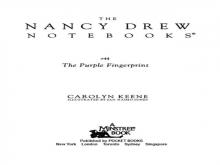 The Purple Fingerprint
The Purple Fingerprint The Picture of Guilt
The Picture of Guilt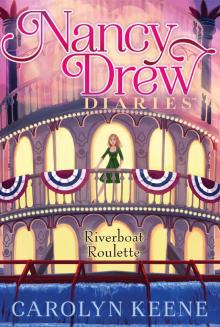 Riverboat Roulette
Riverboat Roulette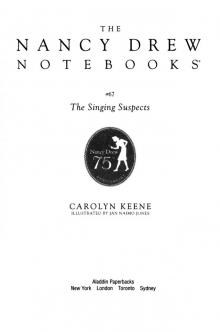 The Singing Suspects
The Singing Suspects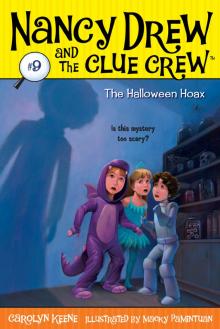 The Halloween Hoax
The Halloween Hoax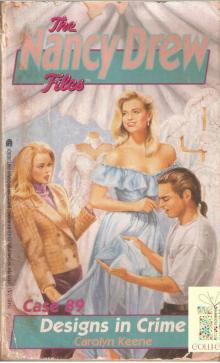 089 Designs in Crime
089 Designs in Crime The Hidden Treasures
The Hidden Treasures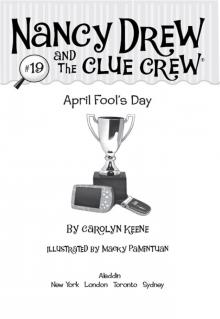 April Fool's Day
April Fool's Day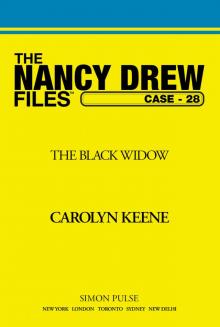 The Black Widow
The Black Widow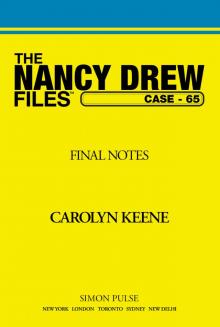 Final Notes
Final Notes The Haunting on Heliotrope Lane
The Haunting on Heliotrope Lane The Runaway Bride
The Runaway Bride The Ghost of Grey Fox Inn
The Ghost of Grey Fox Inn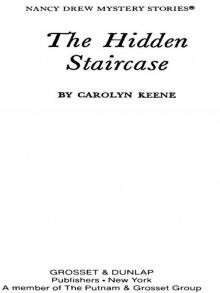 The Hidden Staircase
The Hidden Staircase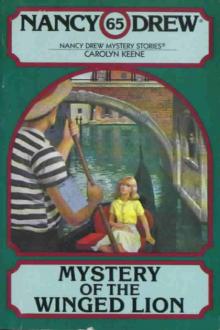 Mystery of the Winged Lion
Mystery of the Winged Lion Over the Edge
Over the Edge The Circus Scare
The Circus Scare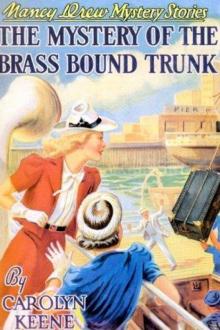 The Mystery of the Brass-Bound Trunk
The Mystery of the Brass-Bound Trunk Ski School Sneak
Ski School Sneak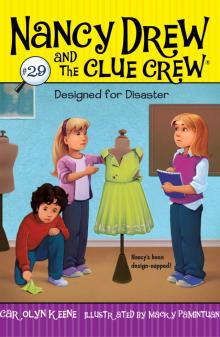 Designed for Disaster
Designed for Disaster The Clue in the Glue
The Clue in the Glue Cold as Ice
Cold as Ice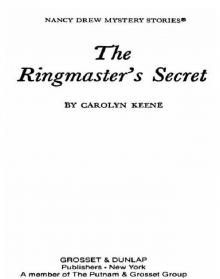 The Ringmaster's Secret
The Ringmaster's Secret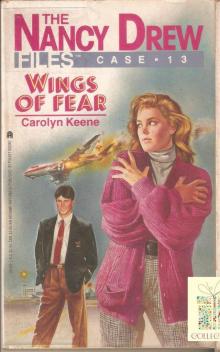 013 Wings of Fear
013 Wings of Fear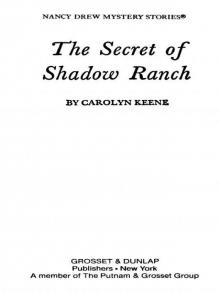 The Secret of Shadow Ranch
The Secret of Shadow Ranch Not Nice on Ice
Not Nice on Ice Earth Day Escapade
Earth Day Escapade Mystery of Crocodile Island
Mystery of Crocodile Island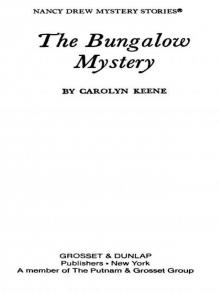 The Bungalow Mystery
The Bungalow Mystery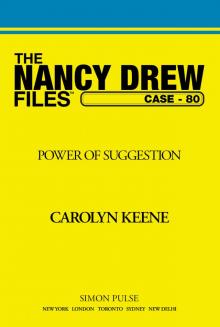 Power of Suggestion
Power of Suggestion The Lemonade Raid
The Lemonade Raid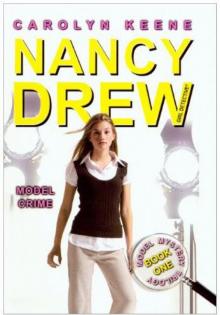 Model Crime
Model Crime The Lucky Horseshoes
The Lucky Horseshoes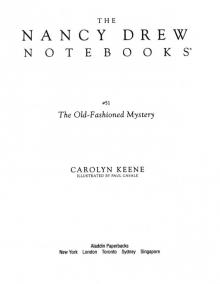 The Secret of the Old Clock
The Secret of the Old Clock The Clue at Black Creek Farm
The Clue at Black Creek Farm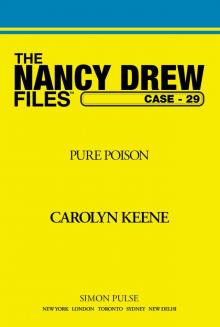 Pure Poison
Pure Poison Nobody's Business
Nobody's Business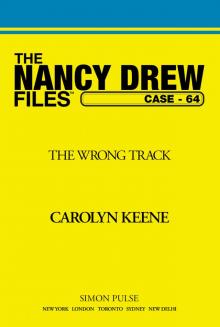 Wrong Track
Wrong Track Chick-Napped!
Chick-Napped!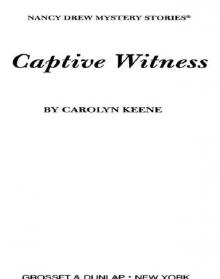 Captive Witness
Captive Witness If Looks Could Kill
If Looks Could Kill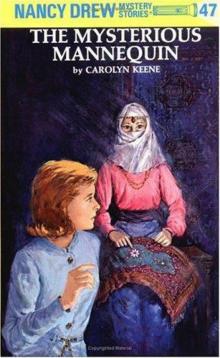 The Mysterious Mannequin
The Mysterious Mannequin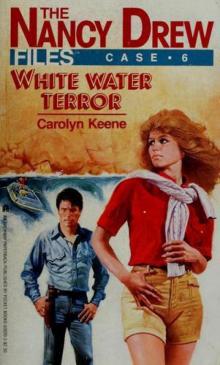 White Water Terror
White Water Terror Mystery of the Midnight Rider
Mystery of the Midnight Rider Space Case
Space Case World Record Mystery
World Record Mystery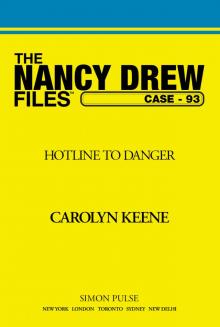 Hotline to Danger
Hotline to Danger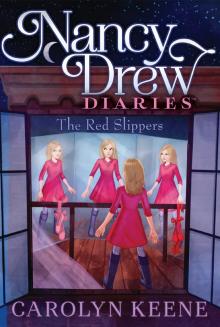 The Red Slippers
The Red Slippers A Crime for Christmas
A Crime for Christmas A Musical Mess
A Musical Mess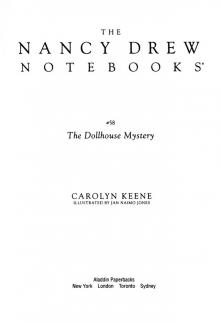 The Dollhouse Mystery
The Dollhouse Mystery Portrait in Crime
Portrait in Crime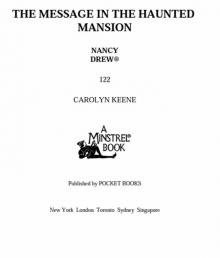 The Message in the Haunted Mansion
The Message in the Haunted Mansion Playing With Fire
Playing With Fire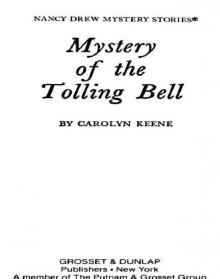 Mystery of the Tolling Bell
Mystery of the Tolling Bell Cutting Edge
Cutting Edge The Gumdrop Ghost
The Gumdrop Ghost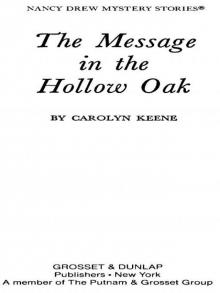 The Message in the Hollow Oak
The Message in the Hollow Oak Trial by Fire
Trial by Fire Mystery at Moorsea Manor
Mystery at Moorsea Manor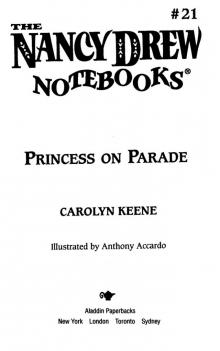 Princess on Parade
Princess on Parade The Flying Saucer Mystery
The Flying Saucer Mystery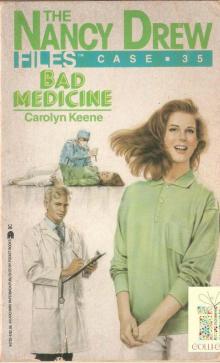 035 Bad Medicine
035 Bad Medicine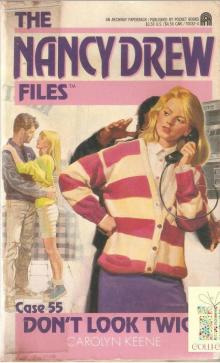 055 Don't Look Twice
055 Don't Look Twice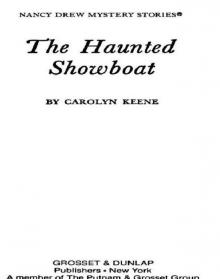 The Haunted Showboat
The Haunted Showboat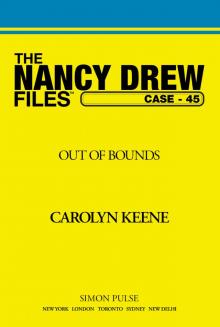 Out of Bounds
Out of Bounds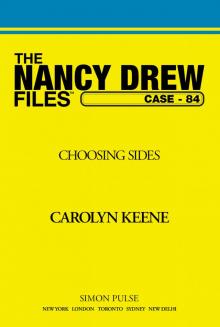 Choosing Sides
Choosing Sides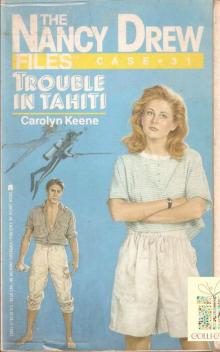 031 Trouble in Tahiti
031 Trouble in Tahiti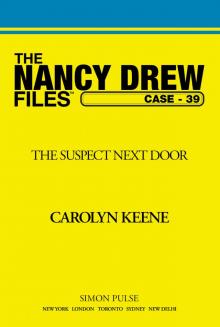 The Suspect Next Door
The Suspect Next Door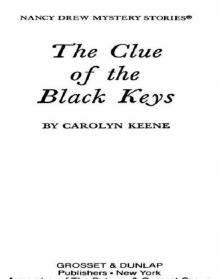 The Clue of the Black Keys
The Clue of the Black Keys The Secret Santa
The Secret Santa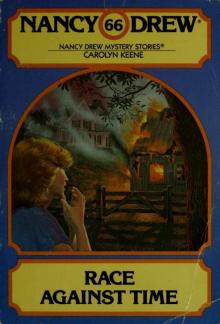 Race Against Time
Race Against Time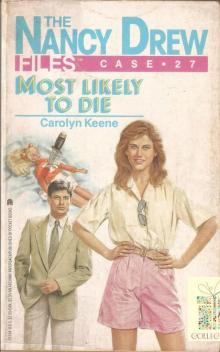 027 Most Likely to Die
027 Most Likely to Die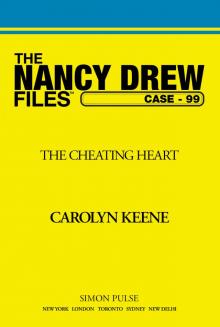 The Cheating Heart
The Cheating Heart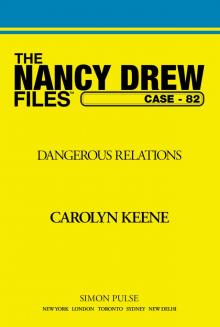 Dangerous Relations
Dangerous Relations It's No Joke!
It's No Joke! The Mystery of the Mother Wolf
The Mystery of the Mother Wolf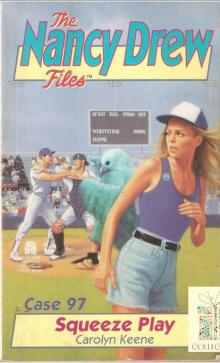 097 Squeeze Play
097 Squeeze Play Secret at Mystic Lake
Secret at Mystic Lake The Double Jinx Mystery
The Double Jinx Mystery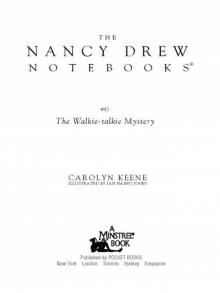 The Walkie Talkie Mystery
The Walkie Talkie Mystery The Case of the Vanishing Veil
The Case of the Vanishing Veil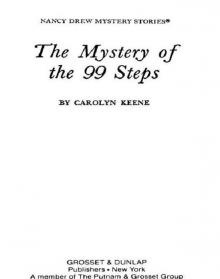 The Mystery of the 99 Steps
The Mystery of the 99 Steps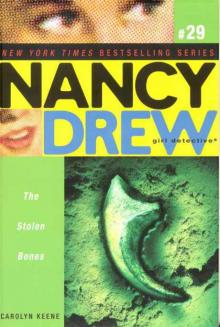 The Stolen Bones
The Stolen Bones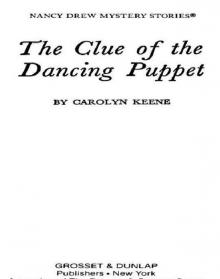 The Clue of the Dancing Puppet
The Clue of the Dancing Puppet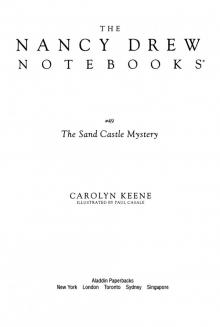 The Sand Castle Mystery
The Sand Castle Mystery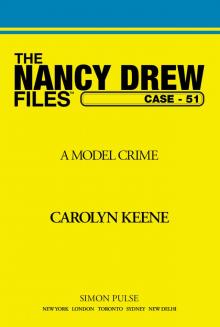 A Model Crime
A Model Crime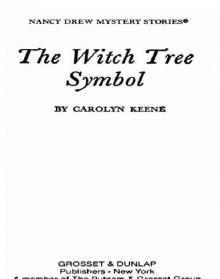 The Witch Tree Symbol
The Witch Tree Symbol The Case of the Artful Crime
The Case of the Artful Crime Mall Madness
Mall Madness Swiss Secrets
Swiss Secrets The Magician's Secret
The Magician's Secret Tall, Dark and Deadly
Tall, Dark and Deadly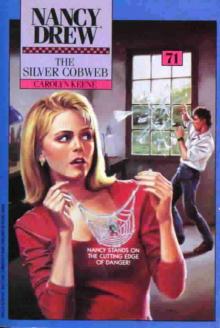 The Silver Cobweb
The Silver Cobweb The Clue of the Gold Doubloons
The Clue of the Gold Doubloons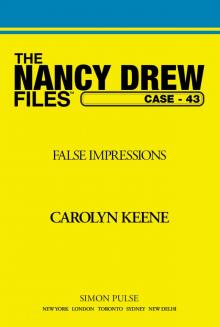 False Impressions
False Impressions Model Suspect
Model Suspect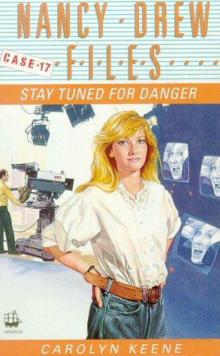 Stay Tuned for Danger
Stay Tuned for Danger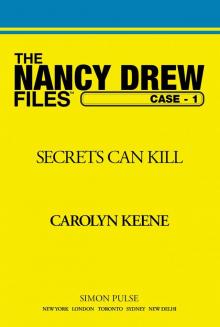 Secrets Can Kill
Secrets Can Kill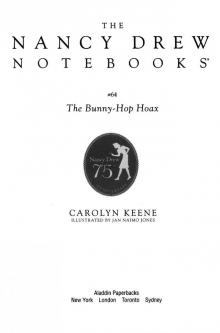 The Bunny-Hop Hoax
The Bunny-Hop Hoax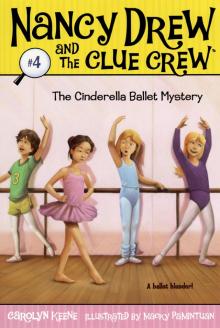 The Cinderella Ballet Mystery
The Cinderella Ballet Mystery The Secret at Solaire
The Secret at Solaire Trash or Treasure?
Trash or Treasure? The Missing Horse Mystery
The Missing Horse Mystery The Lost Locket
The Lost Locket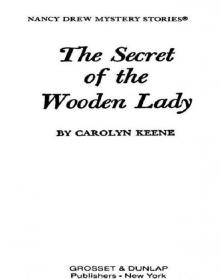 The Secret of the Wooden Lady
The Secret of the Wooden Lady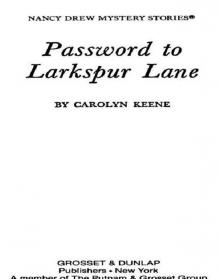 Password to Larkspur Lane
Password to Larkspur Lane Movie Madness
Movie Madness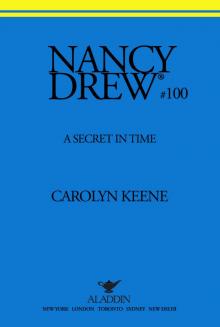 A Secret in Time
A Secret in Time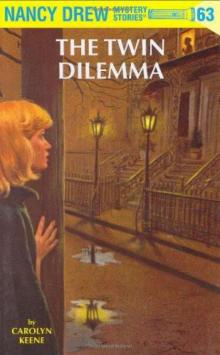 The Twin Dilemma
The Twin Dilemma Candy Is Dandy
Candy Is Dandy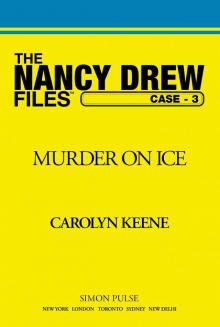 Murder on Ice
Murder on Ice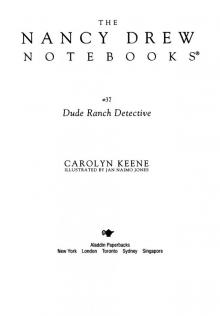 Dude Ranch Detective
Dude Ranch Detective The Slumber Party Secret
The Slumber Party Secret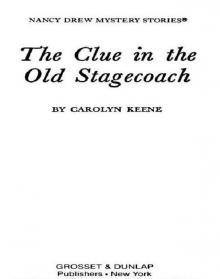 The Clue in the Old Stagecoach
The Clue in the Old Stagecoach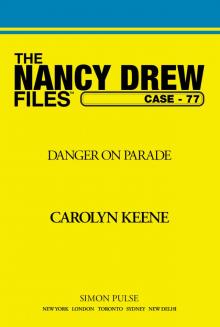 Danger on Parade
Danger on Parade Big Top Flop
Big Top Flop Strangers on a Train
Strangers on a Train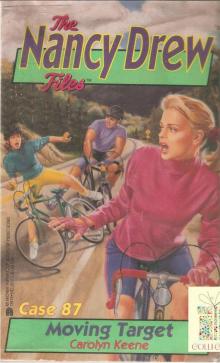 087 Moving Target
087 Moving Target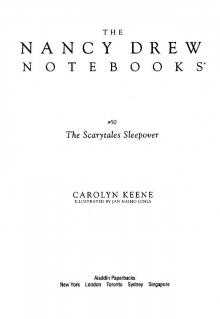 The Scarytales Sleepover
The Scarytales Sleepover The Mystery of the Fire Dragon
The Mystery of the Fire Dragon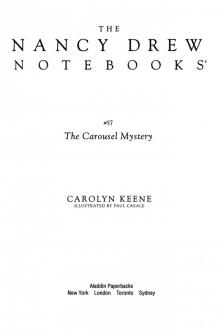 The Carousel Mystery
The Carousel Mystery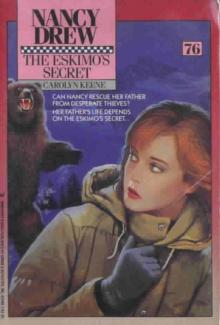 The Eskimo's Secret
The Eskimo's Secret Thrill on the Hill
Thrill on the Hill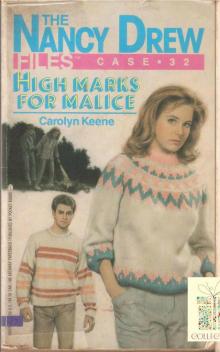 032 High Marks for Malice
032 High Marks for Malice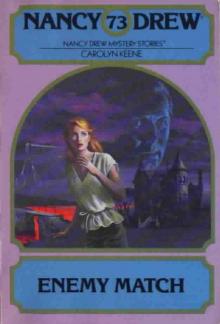 Enemy Match
Enemy Match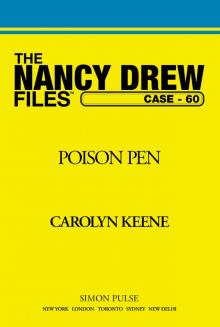 Poison Pen
Poison Pen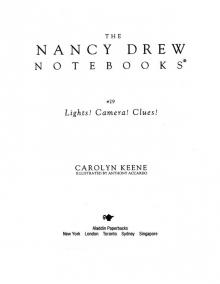 Lights, Camera . . . Cats!
Lights, Camera . . . Cats! Lost in the Everglades
Lost in the Everglades Strike-Out Scare
Strike-Out Scare Third-Grade Reporter
Third-Grade Reporter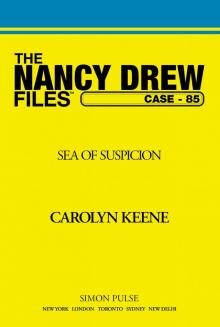 Sea of Suspicion
Sea of Suspicion Wedding Day Disaster
Wedding Day Disaster The Make-A-Pet Mystery
The Make-A-Pet Mystery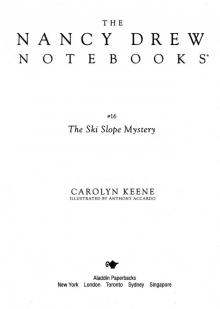 The Ski Slope Mystery
The Ski Slope Mystery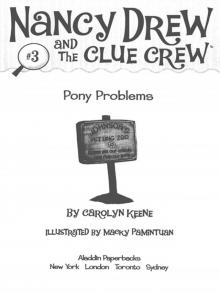 Pony Problems
Pony Problems Candy Kingdom Chaos
Candy Kingdom Chaos The Sign in the Smoke
The Sign in the Smoke The Wrong Chemistry
The Wrong Chemistry Circus Act
Circus Act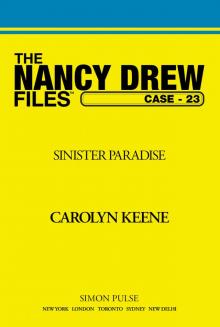 Sinister Paradise
Sinister Paradise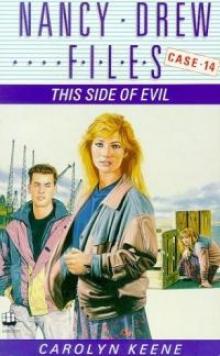 This Side of Evil
This Side of Evil Deadly Doubles
Deadly Doubles The Mystery of the Masked Rider
The Mystery of the Masked Rider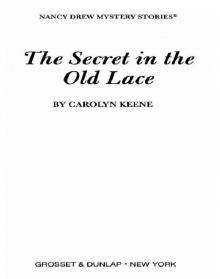 The Secret in the Old Lace
The Secret in the Old Lace The Pen Pal Puzzle
The Pen Pal Puzzle Without a Trace
Without a Trace Whose Pet Is Best?
Whose Pet Is Best?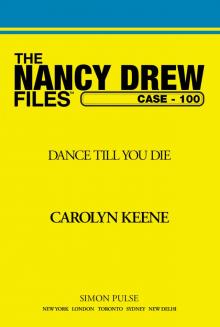 Dance Till You Die
Dance Till You Die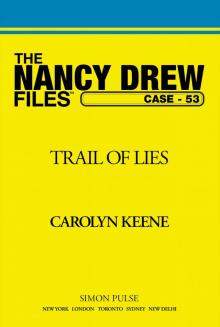 Trail of Lies
Trail of Lies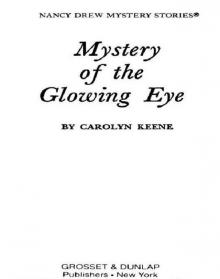 Mystery of the Glowing Eye
Mystery of the Glowing Eye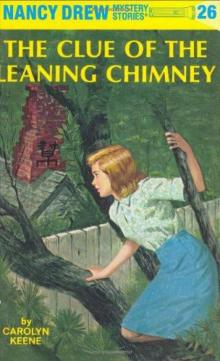 The Clue of the Leaning Chimney
The Clue of the Leaning Chimney The Crook Who Took the Book
The Crook Who Took the Book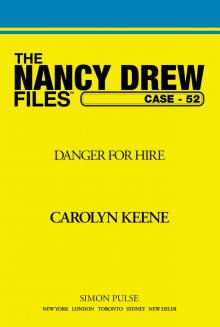 Danger for Hire
Danger for Hire Thanksgiving Thief
Thanksgiving Thief Intruder!
Intruder!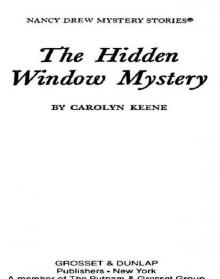 The Hidden Window Mystery
The Hidden Window Mystery Win, Place or Die
Win, Place or Die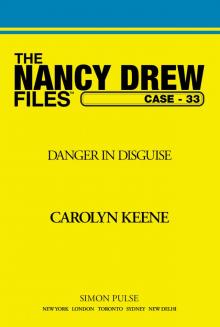 Danger in Disguise
Danger in Disguise The Best Detective
The Best Detective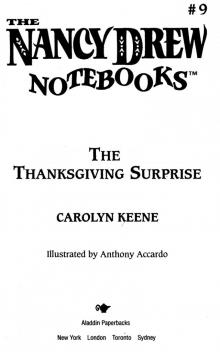 The Thanksgiving Surprise
The Thanksgiving Surprise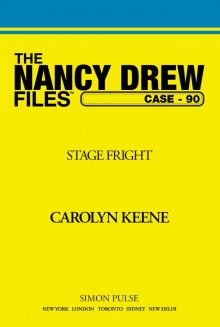 Stage Fright
Stage Fright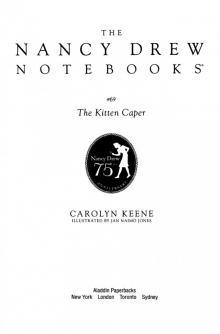 The Kitten Caper
The Kitten Caper Stolen Affections
Stolen Affections The Phantom of Nantucket
The Phantom of Nantucket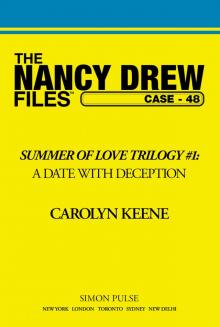 Date With Deception
Date With Deception Cooking Camp Disaster
Cooking Camp Disaster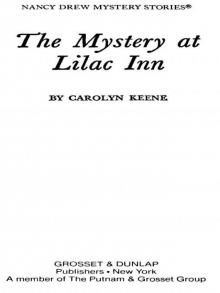 The Mystery at Lilac Inn
The Mystery at Lilac Inn Springtime Crime
Springtime Crime Action!
Action! Into Thin Air
Into Thin Air The Chocolate-Covered Contest
The Chocolate-Covered Contest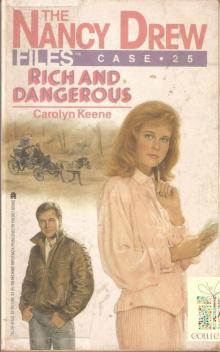 025 Rich and Dangerous
025 Rich and Dangerous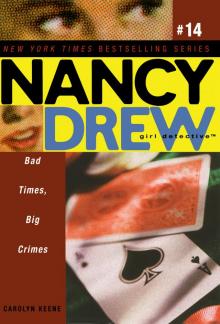 Bad Times, Big Crimes
Bad Times, Big Crimes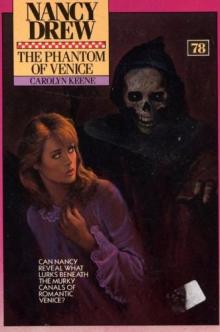 078 The Phantom Of Venice
078 The Phantom Of Venice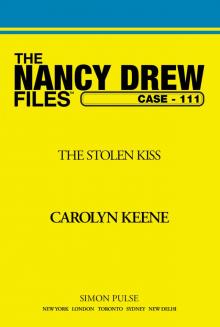 The Stolen Kiss
The Stolen Kiss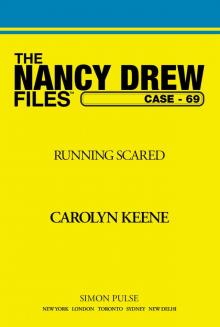 Running Scared
Running Scared The Wedding Gift Goof
The Wedding Gift Goof Time Thief
Time Thief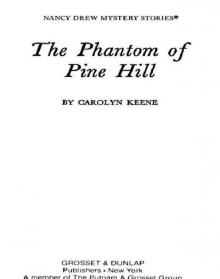 The Phantom of Pine Hill
The Phantom of Pine Hill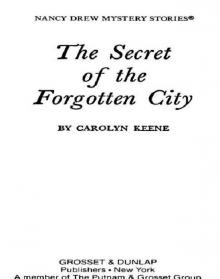 The Secret of the Forgotten City
The Secret of the Forgotten City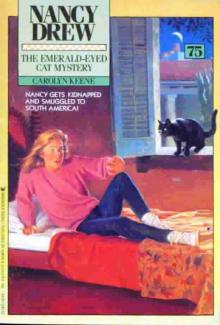 The Emerald-Eyed Cat Mystery
The Emerald-Eyed Cat Mystery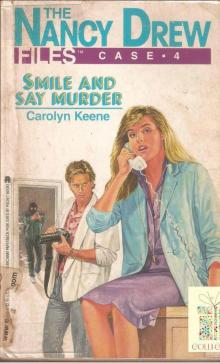 004 Smile and Say Murder
004 Smile and Say Murder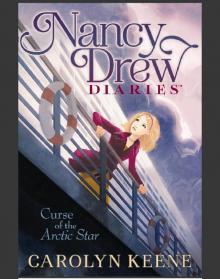 Curse of the Arctic Star
Curse of the Arctic Star Dinosaur Alert!
Dinosaur Alert!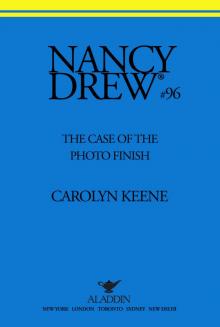 The Case of the Photo Finish
The Case of the Photo Finish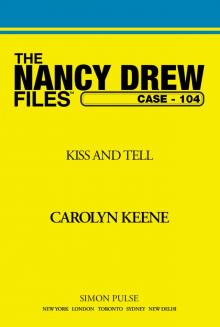 Kiss and Tell
Kiss and Tell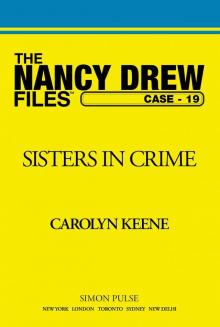 Sisters in Crime
Sisters in Crime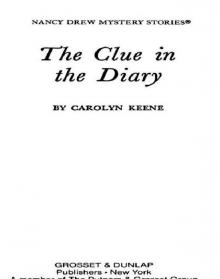 The Clue in the Diary
The Clue in the Diary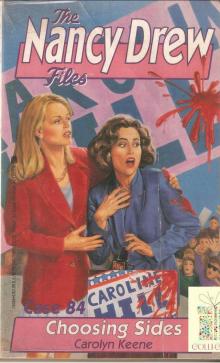 084 Choosing Sides
084 Choosing Sides Haunting of Horse Island
Haunting of Horse Island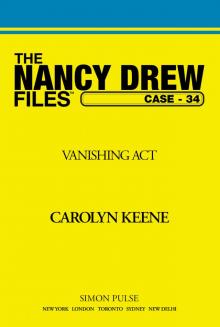 Vanishing Act
Vanishing Act The Big Island Burglary
The Big Island Burglary Danger at the Iron Dragon
Danger at the Iron Dragon Pets on Parade
Pets on Parade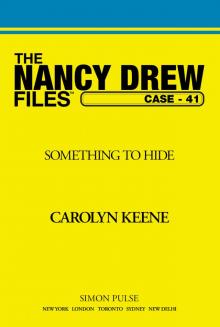 Something to Hide
Something to Hide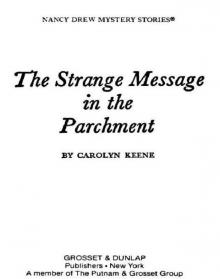 The Strange Message in the Parchment
The Strange Message in the Parchment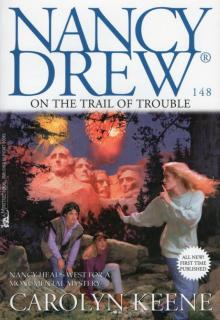 On the Trail of Trouble
On the Trail of Trouble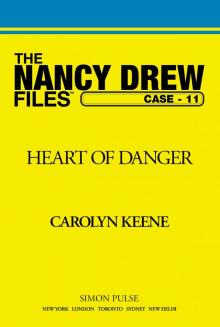 Heart of Danger
Heart of Danger The Snowman Surprise
The Snowman Surprise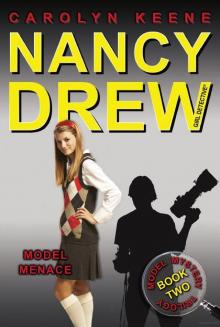 Model Menace
Model Menace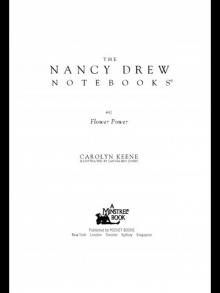 Flower Power
Flower Power The Great Goat Gaffe
The Great Goat Gaffe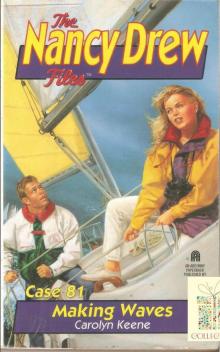 081 Making Waves
081 Making Waves Famous Mistakes
Famous Mistakes The Fashion Disaster
The Fashion Disaster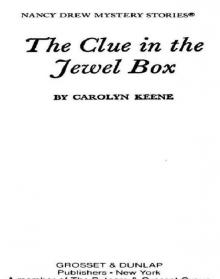 The Clue in the Jewel Box
The Clue in the Jewel Box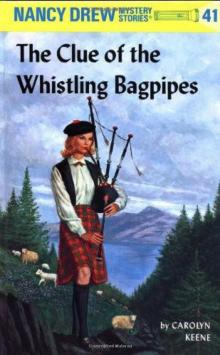 The Clue of the Whistling Bagpipes
The Clue of the Whistling Bagpipes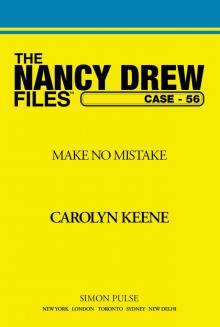 Make No Mistake
Make No Mistake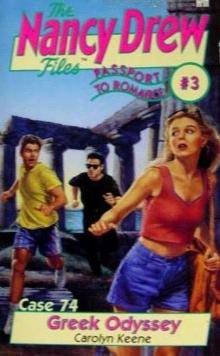 Greek Odyssey
Greek Odyssey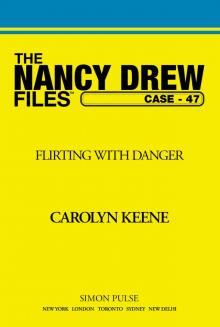 Flirting With Danger
Flirting With Danger Double Take
Double Take Trouble Takes the Cake
Trouble Takes the Cake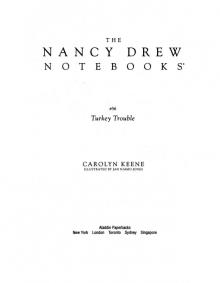 Turkey Trouble
Turkey Trouble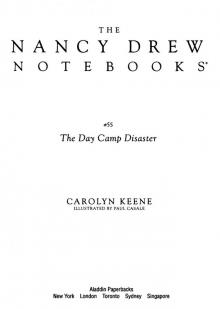 The Day Camp Disaster
The Day Camp Disaster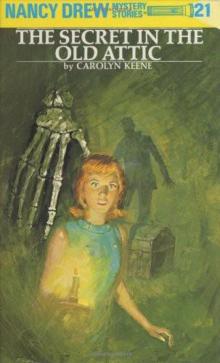 The Secret in the Old Attic
The Secret in the Old Attic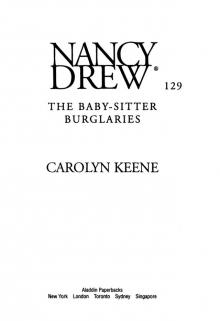 The Baby-Sitter Burglaries
The Baby-Sitter Burglaries Recipe for Murder
Recipe for Murder The Secret of the Scarecrow
The Secret of the Scarecrow Cat Burglar Caper
Cat Burglar Caper Turkey Trot Plot
Turkey Trot Plot Scent of Danger
Scent of Danger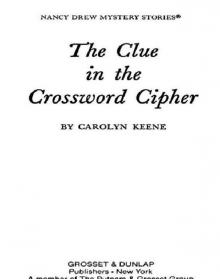 The Clue in the Crossword Cipher
The Clue in the Crossword Cipher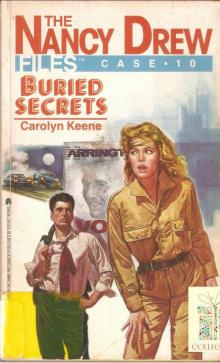 010 Buried Secrets
010 Buried Secrets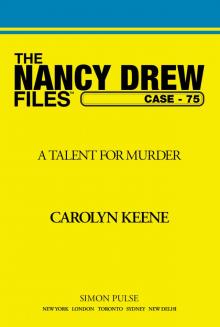 A Talent for Murder
A Talent for Murder The Triple Hoax
The Triple Hoax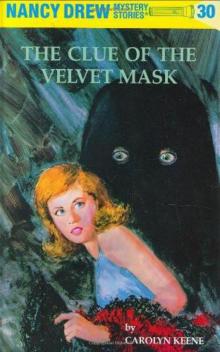 The Clue of the Velvet Mask
The Clue of the Velvet Mask Last Lemonade Standing
Last Lemonade Standing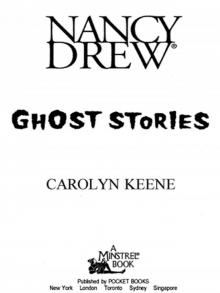 The Ghost of Blackwood Hall
The Ghost of Blackwood Hall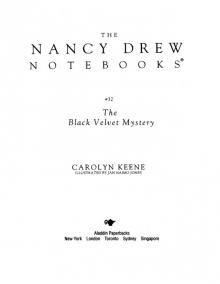 The Black Velvet Mystery
The Black Velvet Mystery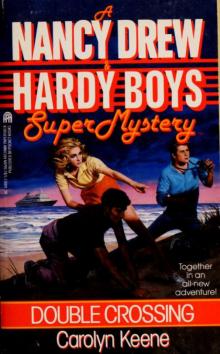 Double Crossing
Double Crossing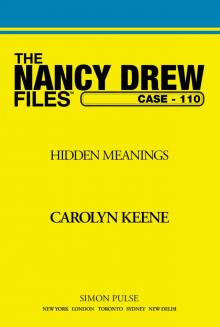 Hidden Meanings
Hidden Meanings Trouble at Camp Treehouse
Trouble at Camp Treehouse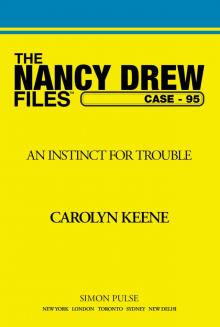 An Instinct for Trouble
An Instinct for Trouble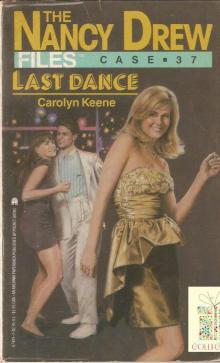 037 Last Dance
037 Last Dance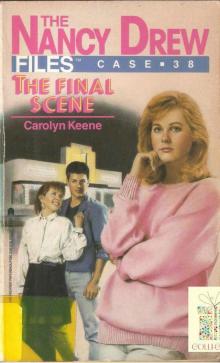 038 The Final Scene
038 The Final Scene Duck Derby Debacle
Duck Derby Debacle The Pumpkin Patch Puzzle
The Pumpkin Patch Puzzle Hidden Pictures
Hidden Pictures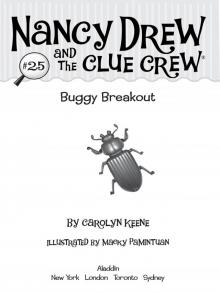 Buggy Breakout
Buggy Breakout California Schemin'
California Schemin'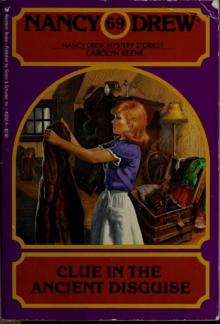 Clue in the Ancient Disguise
Clue in the Ancient Disguise Case of the Sneaky Snowman
Case of the Sneaky Snowman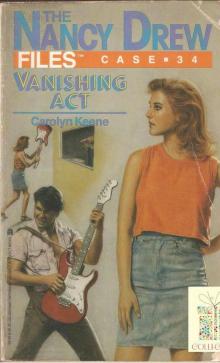 034 Vanishing Act
034 Vanishing Act A Script for Danger
A Script for Danger The Flower Show Fiasco
The Flower Show Fiasco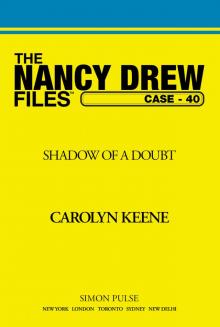 Shadow of a Doubt
Shadow of a Doubt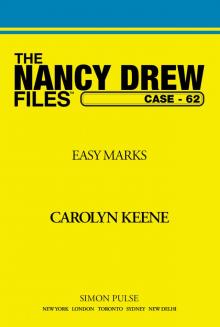 Easy Marks
Easy Marks Alien in the Classroom
Alien in the Classroom Ghost Stories, #2 (Nancy Drew)
Ghost Stories, #2 (Nancy Drew) The Bike Race Mystery
The Bike Race Mystery False Pretenses
False Pretenses The Kachina Doll Mystery
The Kachina Doll Mystery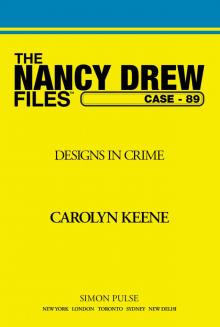 Designs in Crime
Designs in Crime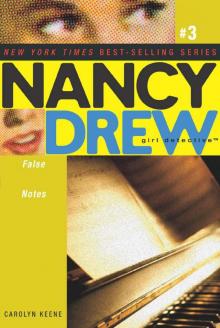 False Notes
False Notes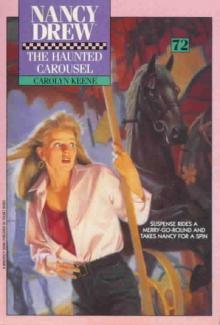 The Haunted Carousel
The Haunted Carousel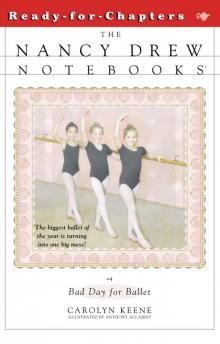 Bad Day for Ballet
Bad Day for Ballet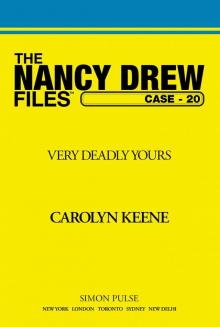 Very Deadly Yours
Very Deadly Yours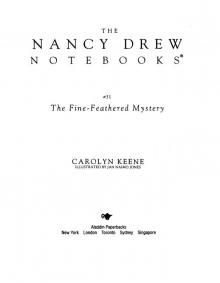 The Fine-Feathered Mystery
The Fine-Feathered Mystery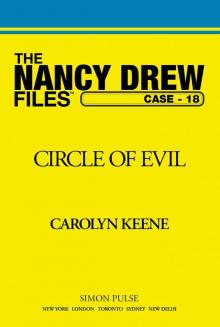 Circle of Evil
Circle of Evil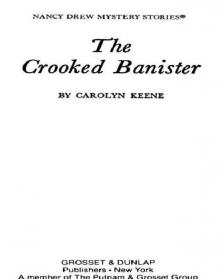 The Crooked Banister
The Crooked Banister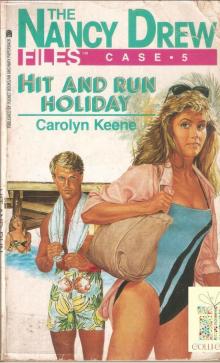 005 Hit and Run Holiday
005 Hit and Run Holiday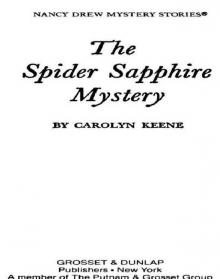 The Spider Sapphire Mystery
The Spider Sapphire Mystery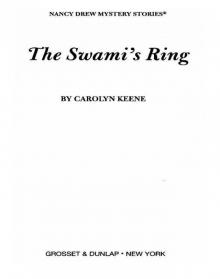 The Swami's Ring
The Swami's Ring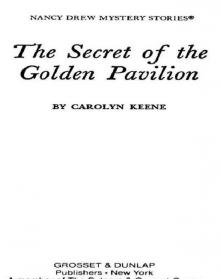 The Secret of the Golden Pavilion
The Secret of the Golden Pavilion Recipe for Trouble
Recipe for Trouble Betrayed by Love
Betrayed by Love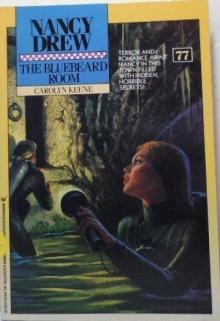 The Bluebeard Room
The Bluebeard Room Sweet Revenge
Sweet Revenge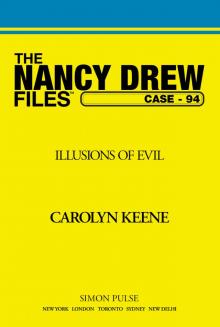 Illusions of Evil
Illusions of Evil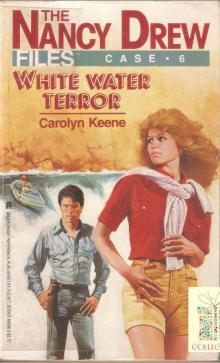 006 White Water Terror
006 White Water Terror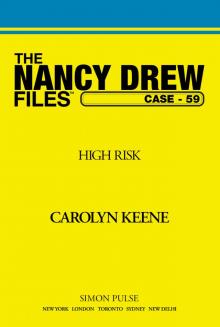 High Risk
High Risk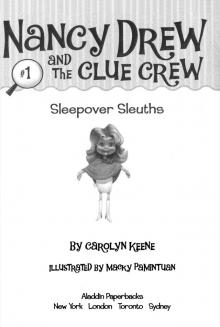 Sleepover Sleuths
Sleepover Sleuths The Clue on the Crystal Dove
The Clue on the Crystal Dove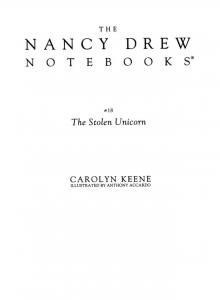 The Stolen Unicorn
The Stolen Unicorn The Professor and the Puzzle
The Professor and the Puzzle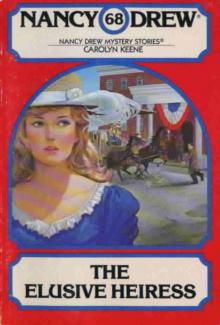 The Elusive Heiress
The Elusive Heiress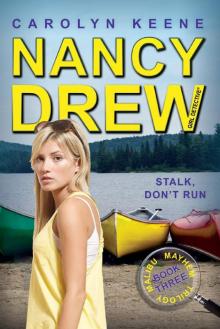 Stalk, Don't Run
Stalk, Don't Run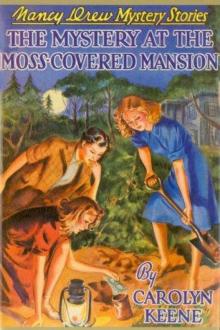 The Mystery at the Moss-Covered Mansion
The Mystery at the Moss-Covered Mansion The Tortoise and the Scare
The Tortoise and the Scare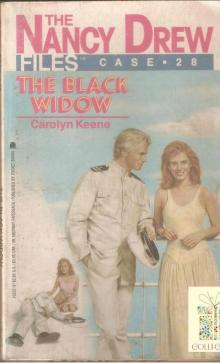 028 The Black Widow
028 The Black Widow Big Worry in Wonderland
Big Worry in Wonderland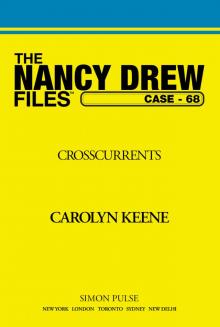 Crosscurrents
Crosscurrents The Dashing Dog Mystery
The Dashing Dog Mystery Fatal Attraction
Fatal Attraction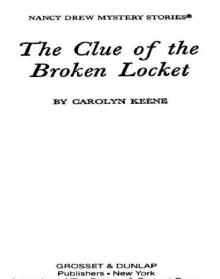 The Clue of the Broken Locket
The Clue of the Broken Locket The Stinky Cheese Surprise
The Stinky Cheese Surprise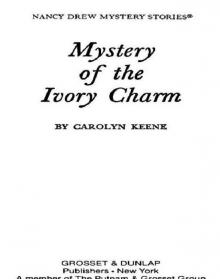 Mystery of the Ivory Charm
Mystery of the Ivory Charm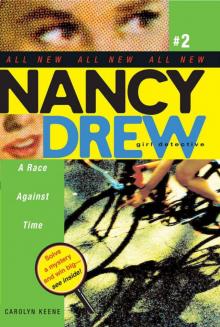 A Race Against Time
A Race Against Time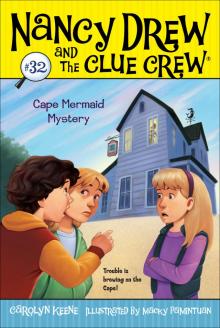 Cape Mermaid Mystery
Cape Mermaid Mystery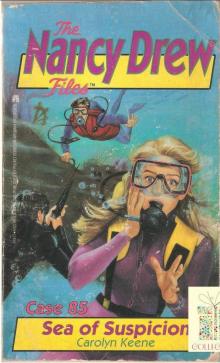 085 Sea of Suspicion
085 Sea of Suspicion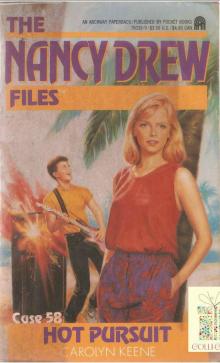 058 Hot Pursuit
058 Hot Pursuit The Secret in the Spooky Woods
The Secret in the Spooky Woods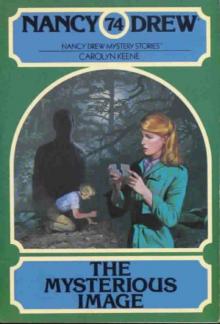 The Mysterious Image
The Mysterious Image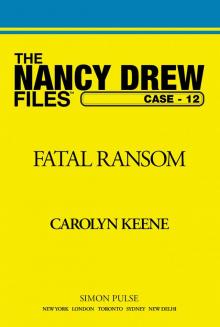 Fatal Ransom
Fatal Ransom The Stolen Show
The Stolen Show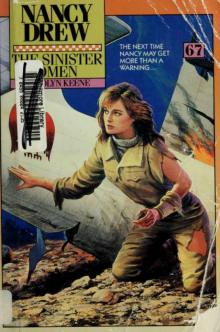 The Sinister Omen
The Sinister Omen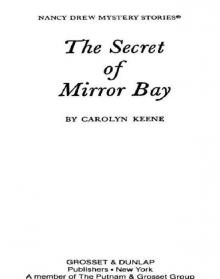 The Secret of Mirror Bay
The Secret of Mirror Bay Rendezvous in Rome
Rendezvous in Rome The Perfect Plot
The Perfect Plot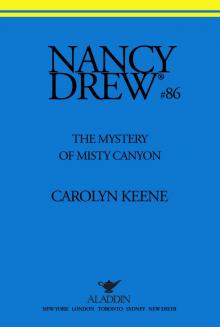 The Mystery of Misty Canyon
The Mystery of Misty Canyon Nancy's Mysterious Letter
Nancy's Mysterious Letter The Snow Queen's Surprise
The Snow Queen's Surprise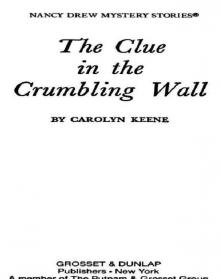 The Clue in the Crumbling Wall
The Clue in the Crumbling Wall Dare at the Fair
Dare at the Fair Scream for Ice Cream
Scream for Ice Cream A Star Witness
A Star Witness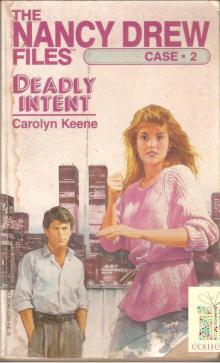 002 Deadly Intent
002 Deadly Intent Museum Mayhem
Museum Mayhem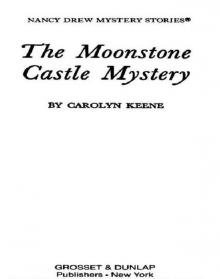 The Moonstone Castle Mystery
The Moonstone Castle Mystery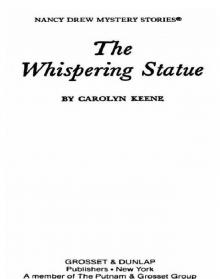 The Whispering Statue
The Whispering Statue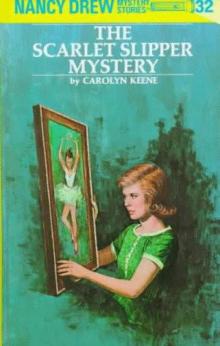 The Scarlet Slipper Mystery
The Scarlet Slipper Mystery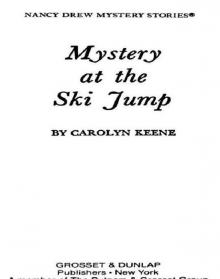 Mystery at the Ski Jump
Mystery at the Ski Jump Hot Pursuit
Hot Pursuit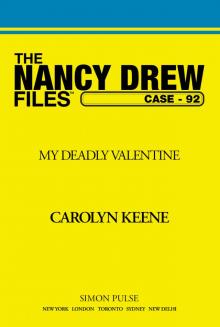 My Deadly Valentine
My Deadly Valentine The Silent Suspect
The Silent Suspect Deep Secrets
Deep Secrets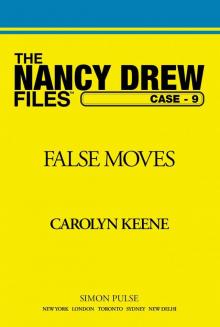 False Moves
False Moves The Zoo Crew
The Zoo Crew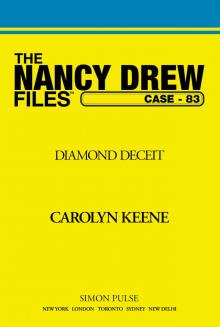 Diamond Deceit
Diamond Deceit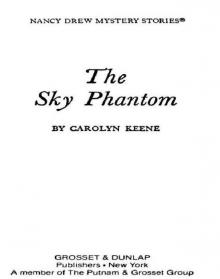 The Sky Phantom
The Sky Phantom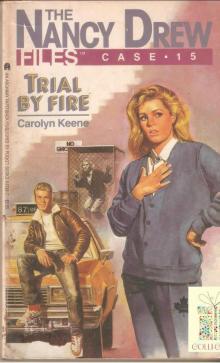 015 Trial by Fire
015 Trial by Fire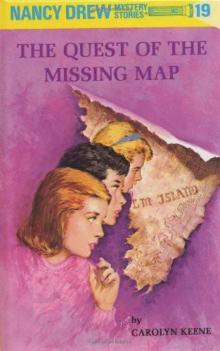 The Quest of the Missing Map
The Quest of the Missing Map Babysitting Bandit
Babysitting Bandit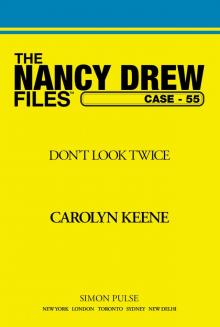 Don't Look Twice
Don't Look Twice Never Say Die
Never Say Die The Soccer Shoe Clue
The Soccer Shoe Clue Pool Party Puzzler
Pool Party Puzzler The Case of the Lost Song
The Case of the Lost Song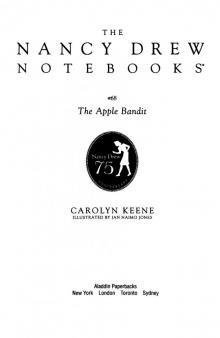 The Apple Bandit
The Apple Bandit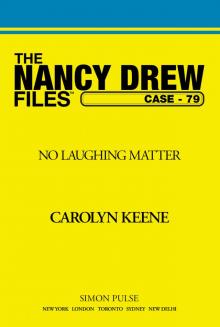 No Laughing Matter
No Laughing Matter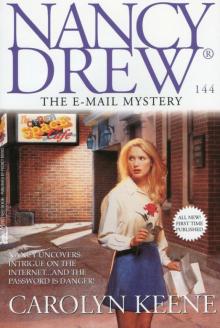 The Thirteenth Pearl
The Thirteenth Pearl Sabotage at Willow Woods
Sabotage at Willow Woods Butterfly Blues
Butterfly Blues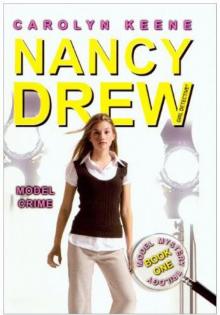 Model Crime 1
Model Crime 1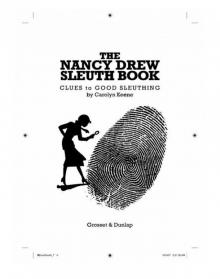 The Nancy Drew Sleuth Book
The Nancy Drew Sleuth Book Mystery by Moonlight
Mystery by Moonlight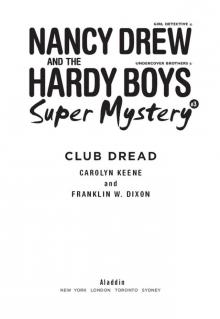 Club Dread
Club Dread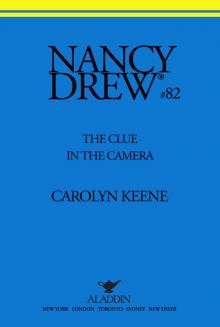 The Clue in the Camera
The Clue in the Camera 118 Betrayed By Love
118 Betrayed By Love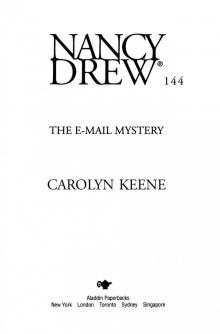 The E-Mail Mystery (Nancy Drew Book 144)
The E-Mail Mystery (Nancy Drew Book 144)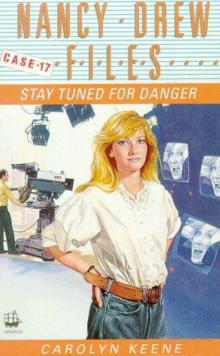 Stay Tuned for Danger: Circle of Evil
Stay Tuned for Danger: Circle of Evil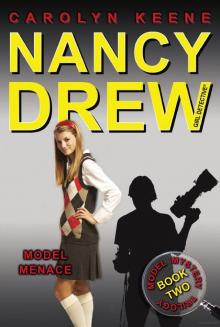 Model Menace 2
Model Menace 2 California Schemin': Book One in the Malibu Mayhem Trilogy
California Schemin': Book One in the Malibu Mayhem Trilogy Zoo Clue (Nancy Drew Notebooks)
Zoo Clue (Nancy Drew Notebooks)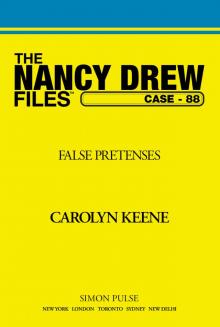 False Pretences
False Pretences 151 The Chocolate-Covered Contest
151 The Chocolate-Covered Contest Close Encounters
Close Encounters The Emeral-Eyed Cat Mystery
The Emeral-Eyed Cat Mystery Boo Crew
Boo Crew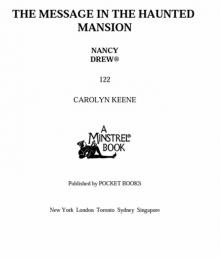 The Message in the Haunted Mansion (Nancy Drew Book 122)
The Message in the Haunted Mansion (Nancy Drew Book 122) A Nancy Drew Christmas
A Nancy Drew Christmas 149 The Clue Of The Gold Doubloons
149 The Clue Of The Gold Doubloons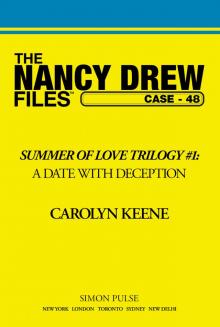 A Date with Deception
A Date with Deception 101 The Picture of Guilt
101 The Picture of Guilt The Secret in the Spooky Woods (Nancy Drew Notebooks Book 62)
The Secret in the Spooky Woods (Nancy Drew Notebooks Book 62)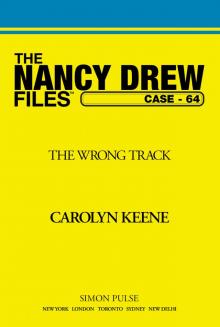 The Wrong Track
The Wrong Track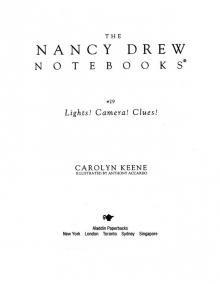 Lights! Camera! Clues!
Lights! Camera! Clues!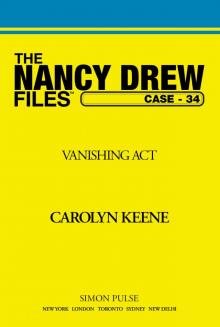 The Vanishing Act
The Vanishing Act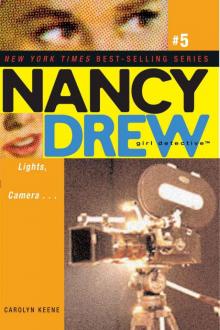 Lights, Camera . . .
Lights, Camera . . . Model Suspect 3
Model Suspect 3 160 The Clue On The Crystal Dove
160 The Clue On The Crystal Dove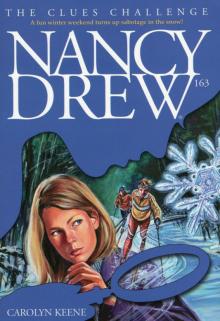 163 The Clues Challenge
163 The Clues Challenge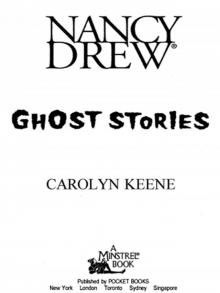 Ghost Stories (Nancy Drew)
Ghost Stories (Nancy Drew) Space Case (Nancy Drew Notebooks Book 61)
Space Case (Nancy Drew Notebooks Book 61) 164 The Mystery Of The Mother Wolf
164 The Mystery Of The Mother Wolf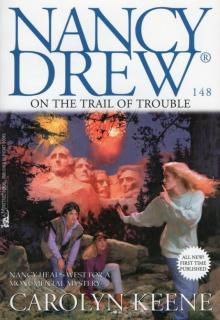 148 On The Trail Of Trouble
148 On The Trail Of Trouble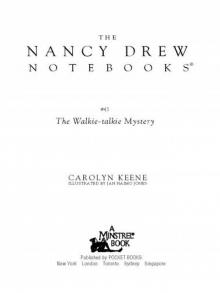 The Walkie-Talkie Mystery
The Walkie-Talkie Mystery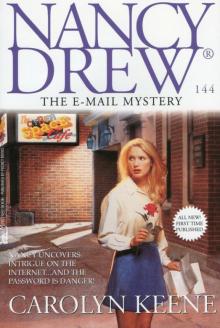 The E-Mail Mystery
The E-Mail Mystery Intruder (Nancy Drew (All New) Girl Detective)
Intruder (Nancy Drew (All New) Girl Detective)![The Stolen Relic [Nancy Drew Girl Detective 007] Read online](http://i1.bookreadfree.com/i2/04/11/the_stolen_relic_nancy_drew_girl_detective_007_preview.jpg) The Stolen Relic [Nancy Drew Girl Detective 007]
The Stolen Relic [Nancy Drew Girl Detective 007] 105 Stolen Affections
105 Stolen Affections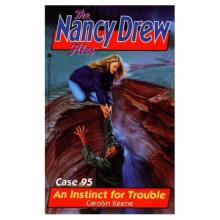 An Instict for Trouble
An Instict for Trouble 161 Lost In The Everglades
161 Lost In The Everglades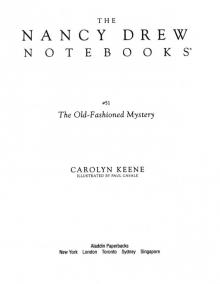 The Old-Fashioned Mystery
The Old-Fashioned Mystery Perfect Plot
Perfect Plot